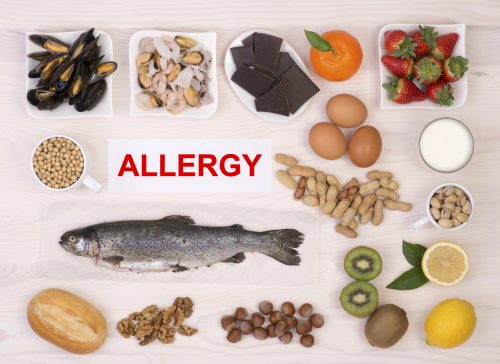Cross-contamination is a commonly understood concept. It occurs when bacteria or viruses contaminate food. It can occur during preparation and storage. Often, proper cooking will reduce or eliminate the contamination, so foodborne illness is less of a risk.
Occasionally, people forget what they are doing and put their newly cooked hamburger patties on the same plate they used to hold the patties when they were raw. This just reintroduces the contamination. Luckily, professional kitchen staff are trained in the proper handling of food and risk is minimized.
When discussing food allergies, we really need to be more aware of cross-contact. They are often referred to as the same thing, but for the sake of education, let’s look at the difference. Understanding of this concept is newer and it’s important food service employees are trained to understand the difference in food handling as well as communication with the guest.
Cross-contact occurs when an allergen from one food is transferred to another food during the storage, preparation, or cooking process. Unlike cross-contamination, cooking does not reduce the allergen in that food, which means the chances of that person having an allergic reaction is not reduced.
People with food allergies have varied levels of food allergen reactions, but because some end up in the hospital at the mere cross-contact of tiny food particles or food dust, appropriate precautions must be taken seriously in all cases.
Here are three types of cross-contact that can cause serious injury to those with food allergies or autoimmune disorders, such as celiac disease:
Food to Food: It may seem obvious that when food touches other food, particles from each food item are left on the other. However, simply removing nuts from a salad will not remove the allergen from the salad. Cross-contact has already occurred and the salad is now a danger to the person allergic to nuts.
Food to Object: This involved allergen particles being transferred to pans, utensils, and cooking surfaces. Wiping fish off of a prep area, quickly rinsing a pan before adding the next food item, using the same spatula or tongs for different dishes, these are all examples of improper food handling and allergen cross-contact.
Food to Saliva: Saliva can absorb allergens. This is why some flights will require bags of peanuts not be served or opened, because there may be someone with a severe peanut allergy and the dust from the peanuts can travel in the closed air-system of the plane, causing a reaction. And we can’t forget the tragic case that hit the news this year of the boyfriend who ate peanut butter and didn’t brush his teeth before kissing his girlfriend who subsequently died of exposure to the peanut product.
Solutions are many, which is why it’s so tragic that cross-contact continues to be a problem. If someone with a food allergen has alerted food service staff to their allergy, the staff need to be well-trained enough to handle the concern responsibly and with sensitivity. Kitchen staff need to have the resources to be able to accommodate food allergies, whether the order is expected or unexpected.
As meetings and events professionals, we need to plan ahead. We know in advance that a percentage of our attendees will have food allergies. Why not reach out with a survey as part of the welcome packet so we can plan for exactly the types of allergies and volume. Try meal tickets during the event as a communication tool to lessen any possible confusion from table to kitchen as well as give the attendee a voice in the process.
Preparation, diligence, and sensitivity are pillars of our duty of care. Contamination and cross-contact are avoidable and communicate our value and respect toward attendees. Let’s include them in our planning and ensure safe dining throughout the entire event.




2 Comments
Beckee Moreland
Great article, Tracy. There’s so much confusion on this subject and your explanation is clear with great examples. Thanks! Keep up the good work to keep those with celiac disease and food allergies safe.
Tracy Stuckrath
Thanks, Beckee! We all need to work together to educate everyone on the various aspects of managing food allergies, celiac disease and more.
Comments are closed.